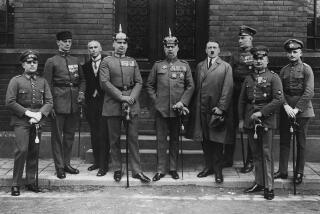Swiss Finally Clear Rescuer of WWII Jews
- Share via
ST. GALLEN, Switzerland — Throughout his adult life, Paul Grueninger was a marked man: Convicted by a Swiss court of illegally helping as many as 3,000 Austrian Jews cross into Switzerland and flee the gathering storm of World War II, he was cashiered from the national constabulary, evicted from his apartment, shunned by his community. Rumors flared that he had filched valuables from defenseless refugees and taken advantage of Jewish girls.
Grueninger died in dishonor in Switzerland in 1972, 80 years old, broken and impoverished. But on Thursday, 23 years after his death, the man now known as Switzerland’s Oskar Schindler was finally exonerated in the same provincial courthouse where he was convicted in 1940 of falsifying the immigration documents of Jewish refugees, thus helping them enter Switzerland.
“I’m glad it’s over,” said Grueninger’s daughter, Ruth Roduner, who appeared fatigued while the presiding judge made brief remarks. “It lasted a long time, 55 years.”
The decision, made by a five-judge panel of St. Gallen’s district court, marked the end of a lengthy battle for a small but dogged group of Grueninger’s admirers, including several former refugees now living in the United States.
It also marked a breakthrough for Switzerland, a country that has been reluctant to acknowledge the accommodationist behavior of its officials during the years of Nazi encirclement.
“We wanted not only to restore Grueninger’s honor posthumously, but we were also concerned about the Swiss version of history,” said Paul Rechsteiner, a lawyer and member of Parliament who argued Grueninger’s case before the St. Gallen court. “Switzerland has to learn about this case so that these things are never repeated.”
Others in the courtroom suggested that Grueninger’s case holds potent moral lessons for officials who today must deal with unwanted immigrants at a time when many European governments are trying to seal their borders against asylum-seekers from Bosnia-Herzegovina and from as far away as Sri Lanka and the killing fields of Central Africa.
“A policeman today who has to send back a refugee will tell you, ‘I can’t help it, I am obliged to send him back,’ ” said Stefan Keller, author of a 1993 biography of Grueninger that became a bestseller in Switzerland and gave momentum to the campaign to exonerate the police captain. “But now, a court has said that [officials] are personally responsible for what they are doing. They can’t just say that they are following orders.”
“Following orders” was the justification used by many police and immigration officials in Switzerland in the late 1930s to send Jews back to Nazi-governed Austria and almost certain death.
In 1938, Adolf Hitler annexed Austria, setting off a tide of would-be refugees to neutral Switzerland. Many of them entered through the border canton of St. Gallen.
Switzerland did not want the refugees, so it closed its borders to Jews on Aug. 19, 1938. To make it easier for border guards to identify Jews, the Swiss government asked Nazi Germany to mark the passports of all German and Austrian Jews with a large, red “J.”
The Nazis were only too happy to oblige.
It then became Grueninger’s job to turn back anyone with a “J” in his or her passport.
A quiet and unexceptional man remembered more for his love of soccer than his political views, Grueninger left no diary and few letters explaining why he bucked the system and saved so many Jews at such a crushing personal cost.
“He wasn’t a gambler, he wasn’t a Schindler, and this is the heart of the story,” said Keller, the biographer, referring to the German industrialist Oskar Schindler, who is credited with saving more than a thousand Jews during World War II. Grueninger “was very common, very ordinary. Nobody thought that such a man would become a hero.”
Elderly former refugees who returned to St. Gallen for Grueninger’s brief retrial this week recalled that when they were intercepted at the border, guards told them not to worry, that Grueninger would be called.
The refugees were then instructed that when the captain appeared, they should beg him to shoot them on the spot, rather than send them back into Austria. When they did so, Grueninger would announce that they could stay in Switzerland.
“They made this piece of theater,” remembered the Vienna-born Kurt Hutschneker, who escaped Austria at the age of 12.
Grueninger would also stamp the refugees’ passports with a false date, so that it would look as if they had entered Switzerland before the border was closed.
The Gestapo eventually got wind of these machinations and complained to Swiss authorities.
Swiss higher-ups who had initially turned a blind eye to Grueninger’s rescue operation now testified against him. He was fired, stripped of his right to a pension, thrown out of his state-sponsored apartment and convicted of forgery.
At 48, the once-powerful captain was unable to find a new job in St. Gallen and had to move to the city of Basel. There he scrounged for a living selling anything from cheap raincoats to swine fodder.
Thursday’s decision has attracted attention in Germany, where several hundred other convicted criminals from World War II--deserters from Hitler’s Wehrmacht--are also waging a battle to have their names cleared.
The elderly deserters are all that is left of about 30,000 German soldiers who refused to fight in the war and who were accordingly sentenced to death. About 20,000 were, in fact, executed, but many others escaped.
The few who survive today still have criminal records, have seen their pensions reduced and have found it impossible to get jobs in the German civil service.
The German government’s argument against them resembles the now-discredited Swiss argument against Grueninger: What they did may have been morally right, but it still broke the law.
More to Read
Sign up for Essential California
The most important California stories and recommendations in your inbox every morning.
You may occasionally receive promotional content from the Los Angeles Times.













